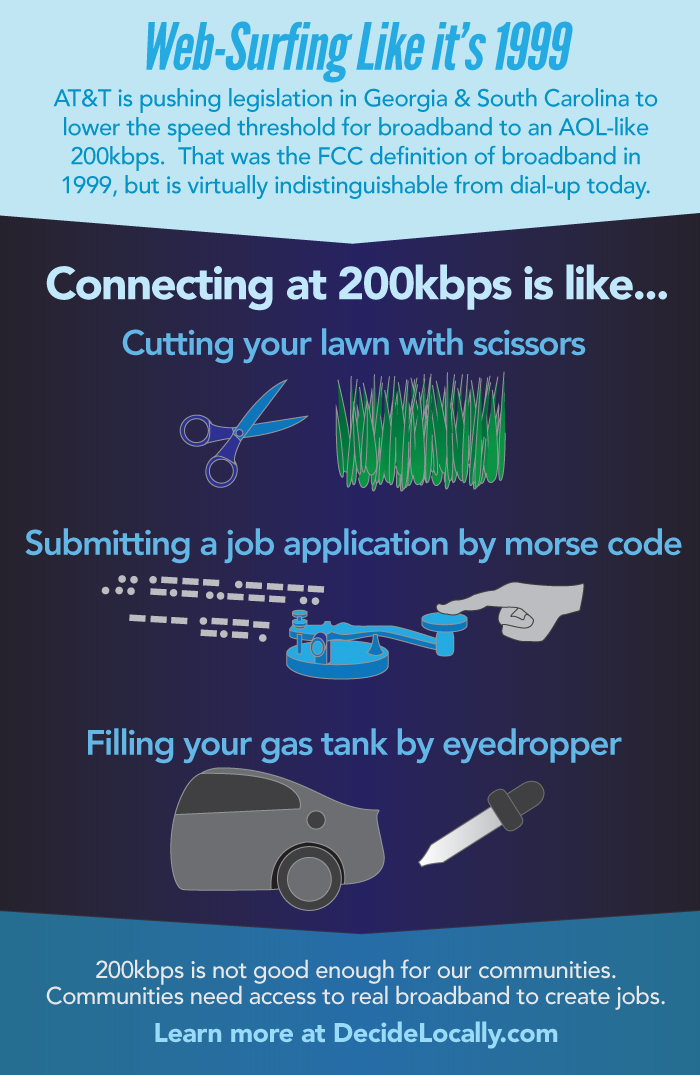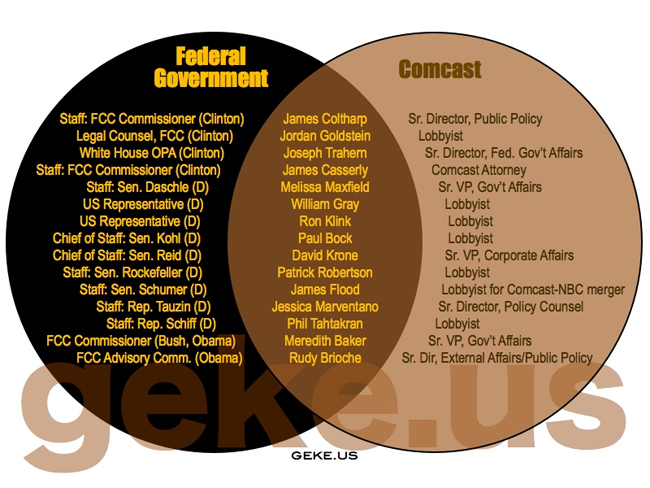
Fast, affordable Internet access for all.

Free Press caught and isolated an excellent question from Senator Frank Lautenberg (D-NJ) to FCC Chairman Genachowski during recent hearings. The Senator notes that many Americans do not have sufficient access to broadband but 19 states have enacted barriers to make it harder for communities to build their own.
FCC Chairman said he thinks innovative municipal solutions should be encouraged and that he looks forward to working with the Committee to address the obstacles.
 Feel free to spread it around. Higher quality pdf below.
Feel free to spread it around. Higher quality pdf below.In truly competitive markets that display some degree of commodity-like characteristics, large and small vendors tend to coexist. I'm drinking coffee right now, which is a good example. Maybe Maxwell House and Folgers (and their parent companies) have a large share of the market, competing on price for their swill. But there is plenty of room for others to differentiate their product. Dunkin and Starbucks have built huge chains on their own style of semi-premium product, while another couple of niches of premium and superpremium beans are easy enough to find. Food markets tend to be like this; check out any Whole Foods (a/k/a The Museum of Modern Vegetables) for a supply of priced-above-commodity products. I feel foolish for selling most (not all, thankfully) of my Whole Foods stock when it was in the dumps a couple of years ago. The same thing happens in many fields. Apple itself sells computers above commodity price levels. There's a whole "high end" audio business catering to those who like to show off how much they can afford to spend. The automobile industry has mass-market commodity cars and several premium tiers. Internet access in the US lacks that because the natural monopoly on outside plant is not properly regulated. If it were treated here by EU norms, then any number of ISPs could access the wire. Some would just be cheap; some would offer premium help desks among their services. That doesn't happen, however, when the usual number of "competitors" is two. Even more so when those competitors agree that they should divide up markets between themselves rather than overbuild, or (heaven forbid) let outside information providers onto their facilities. The wire should be regulated. ISPs shouldn't.Amen. Physical connections are a natural monopoly. Even if the economics supported many physical providers, having so many would be terribly inefficient. Much better to have networks that are owned by the community and have independent service providers competing to deliver services -- just like the roads.
The Minnesota Public Utilities Commission will convene an informational meeting in the format of panel discussion to examine the implications of the FCC Order with respect to (i) universal service funding, (ii) intercarrier compensation and (iii) the substantive and procedural tasks that the Commission can be expected to face in the coming months. The meeting will commence with opening remarks by Commission Chair Ellen Anderson and Commissioner Michael Rothman of the Minnesota Department Commerce. The panel discussion will be moderated by Commissioner Betsy Wergin. The panelists are:I would have specifically liked to hear how the rural telephone coops would be affected by the inter-carrier compensation changes as those charges have helped many rural communities gain access to broadband. Apparently, the MTA rep will represent their viewpoint.The Commission will welcome questions from attendees as time permits.
- Jeff Lindsey; CenturyLink
- Brent Christensen; Minnesota Telecom Alliance
- Dan Lipschultz; Moss Barnett PA, competitive carrier perspective
- Tom Cohen; Kelley, Drye Warren LLP for the American Cable Association
- Dave Conn; T-Mobile
- Dennis Ahlers; Minnesota Department of Commerce.
 Reforming this system is a deep, seemingly intractable problem. But for those looking for answers, a good place to start is with the work of Lawrence Lessig. I just finished his Republic, Lost, which offers a grand tour of the problems resulting from the present system of campaign finance.
You can also see a number of his presentations here.
His organization, the Rootstrikers aim to get to the root of problems rather than being distracted by trying to fix symptoms of deeper problems. This is precisely what we do with our focus on community networks.
Many focus solely on resolving digital divide issues, improving rural access to the Internet, lowering the cost of broadband, or the various other problems that result from narrowly-focused private corporations owning and controlling essential communications infrastructure with inadequate regulations.
Reforming this system is a deep, seemingly intractable problem. But for those looking for answers, a good place to start is with the work of Lawrence Lessig. I just finished his Republic, Lost, which offers a grand tour of the problems resulting from the present system of campaign finance.
You can also see a number of his presentations here.
His organization, the Rootstrikers aim to get to the root of problems rather than being distracted by trying to fix symptoms of deeper problems. This is precisely what we do with our focus on community networks.
Many focus solely on resolving digital divide issues, improving rural access to the Internet, lowering the cost of broadband, or the various other problems that result from narrowly-focused private corporations owning and controlling essential communications infrastructure with inadequate regulations. As you read this, remember that the FCC's National Broadband Plan largely places the future of Internet access in the hands of these corporations.
As you read this, remember that the FCC's National Broadband Plan largely places the future of Internet access in the hands of these corporations.“Without the combination, we think the wireless industry will be further weakened by continued hypercompetitive activity, particularly regarding subscriber acquisition costs,” said Nomura Securities analyst Mike McCormack. That means customers can still get lower rates as the industry competes for their dollars. T-Mobile, for example, will continue to be a low-cost competitor, according to consumer advocacy group Consumers Union. A survey showed that data plans from T-Mobile were $15 to $50 less per month than those offered by AT&T.An excellent reminder that what is best for Wall Street is not what is best for the 99%. Big companies like AT&T find competing for customers a hassle that lowers their profits -- they consider a market with four sellers to be hypercompetitive. In wireline, they have acquiesced to the "competition" of two competitors -- cable and DSL. This is one reason communities build their own networks -- the private sector is not truly competitive when it comes to ISPs and most communities have no prospect real of improvement absent a public investment. But we should rejoice in this victory -- because we earned it. Without the hard work of many grassroots groups, it is hard to imagine the Department of Justice or FCC standing up to such a powerful corporation.
Dane Jasper, the CEO of Sonic.net, one of the few ISPs to survive the death of broadband competition over the past ten years, wrote about "America's Intentional Broadband Duopoly." It is a short history of how the FCC's flawed analysis (helped along by incredible amounts of lobbying dollars, no doubt).
He starts by asking when the last time anyone offered to sell you broadband over power lines (BPL). The FCC decided that cable and telephone companies shouldn't have to share their wires (which are a natural monopoly) with competitors (creating an actual marketplace for services) because BPL, satellite, and wireless would put so much competitive pressure on DSL and cable. FAIL.
Then, in the Brand X decision, they ruled that Cable would not be required to allow competitors to lease their lines either. The FCC did this by reclassifying broadband Internet access as an “information service”, rather than a “telecommunications service”. As a result, common carriage rules could be set aside, allowing for an incumbent Cable monopoly. This decision was challenged all the way to the supreme court, who ruled in 2005 that the FCC had the jurisdiction to make this decision. To close out Powell’s near-complete dismantling of competitive services in the U.S., the FCC took up the issue of ISPs resale of DSL using the incumbent’s equipment, also known as wholesale “bitstream” access. If Cable is an information service under Brand X, why shouldn’t Telco have the same “regulatory relief”? The result: the FCC granted forbearance (in other words, declined to enforce its rules) from the common carriage requirements for telco DSL services.For those who are thinking that wireless is finally competitive with cable and DSL, don't forget that while 4G appears much faster (because so few people are using it presently), it still comes with a 2GB monthly cap. So if you want to do something with your connection aside from watching one movie a month, 4G is not competitive with a landline connection.
The truth is that if we want to make sure small businesses can grow with the assistance of broadband, the Internet must remain open.